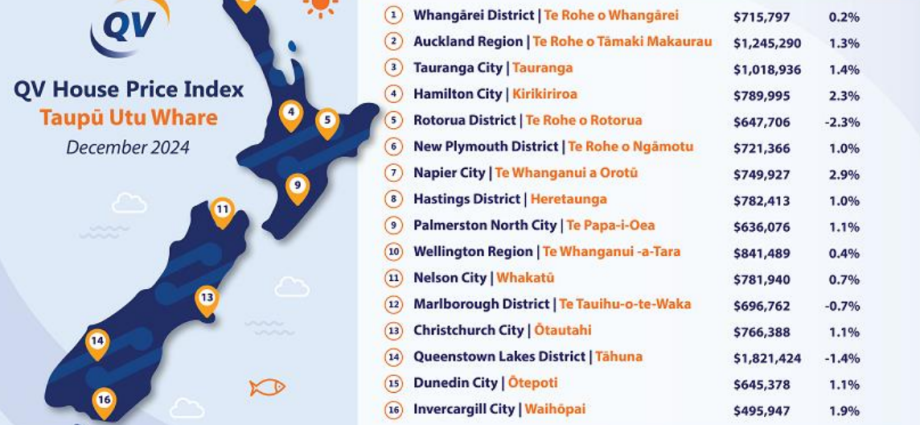PHOTO: Quotable Value NZ
KEY FACTS:
- In early 2022, the housing market in New Zealand peaked.
- Auckland regional values peaked at $1.54 million in late 2021.
- In December 2024, Auckland regional values were $1.24 million, down 19.2% from their peak.
- In November 2024, the average home value in New Zealand was 14.6% below its peak.
- In May 2024, the average home value was 14.4% below its peak.
- Low sales volumes and a large number of properties available for sale have created a buyers’ market.
- High interest rates have limited price growth.
- Declines in new dwelling building consents have contributed to a complex outlook for the housing sector.
New Zealand Real Estate Market Update: QV House Price Index – December Quarter 2024
According to the latest data from the QV House Price Index, New Zealand’s residential property market experienced modest growth in the December 2024 quarter, with national property values edging up by an average of just 0.1%. However, this small increase was not enough to turn the market positive for the year. The average home value now sits at $902,414, marking a 0.3% decline from the start of 2024 and a significant 15.2% drop from the market’s peak just over three years ago.
Regional Property Trends – December Quarter 2024
While the national average shows slight growth, the December quarter saw mixed results across New Zealand’s main urban areas. Three major urban centres experienced a modest decline in average home values, with Rotorua (-2.3%), Marlborough (-0.7%), and Queenstown (-1.4%) leading the way in reductions.
On the flip side, most of New Zealand’s urban areas saw average home values rise. Auckland recorded a 1.3% increase, Wellington grew by 0.4%, and Christchurch saw a 1.1% increase. These modest gains mean that seven of the country’s largest cities will begin 2025 with their average home values sitting slightly higher compared to the start of 2024. These cities include:
- Hamilton: +0.6%
- New Plymouth: +2%
- Nelson: +0.6%
- Christchurch: +1.8%
- Queenstown: +2.5%
- Dunedin: +2.9%
- Invercargill: +3.9%
Regional Property Value Shifts
In New Zealand’s smaller towns and districts, fluctuations in property values have been more pronounced, largely due to low sales volumes impacting the accuracy of statistics. Notable regional changes include Kaikoura and Otorohanga, which experienced some of the largest declines in average home values for the quarter.
In contrast, Wairoa and Opotiki saw the largest increases in average home values, indicating potential growth in these areas despite broader market trends.
Looking Ahead: A Mixed Market in 2025
As we enter 2025, the New Zealand property market continues to show signs of variability across different regions. While national growth remains modest, certain areas, particularly those in smaller towns, are witnessing larger fluctuations in home values. Investors and homeowners alike will need to closely monitor these trends as low sales volumes and regional disparities are expected to continue shaping the market in the coming months.
For more insights on New Zealand’s property market, including updates on key urban and regional areas, stay tuned to our regular real estate reports.














